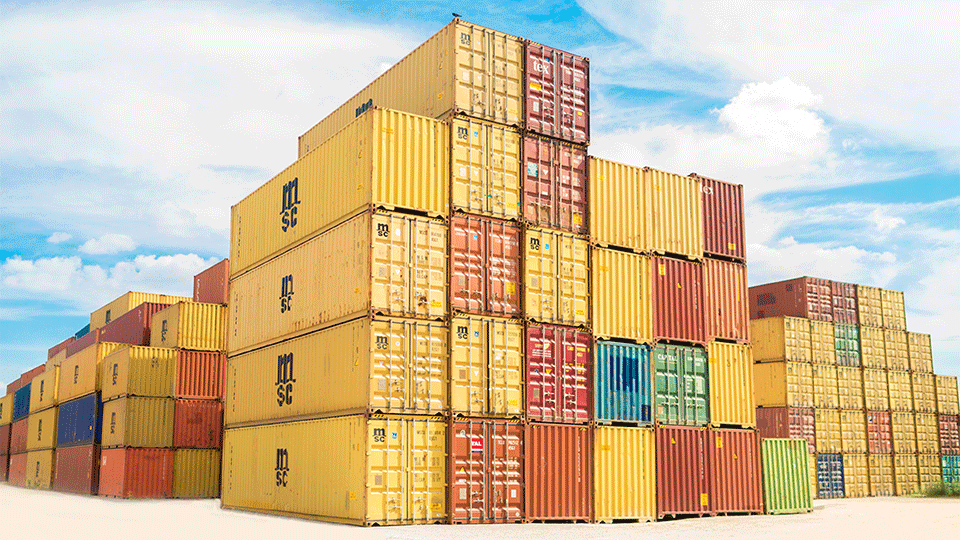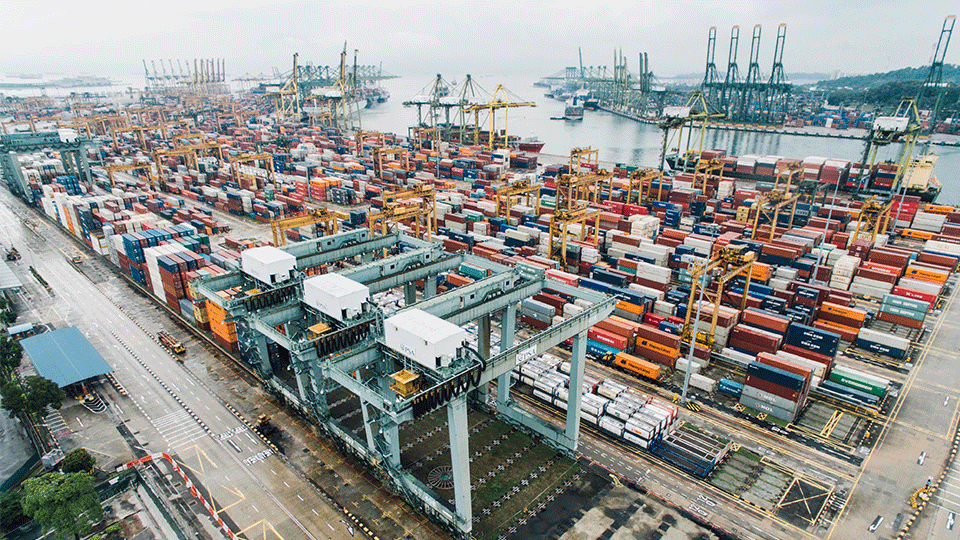In the maritime transportation industry, there are a ton of ancillary fees, many of which are levied based on the services port workers, like stevedores, provide your cargo.
In recent history, port congestion, labor issues and container-manufacturing shortages sent container-shipping prices sky-high, raising many of these port service charges.
Although global container shipping costs have subsided from peak pandemic levels, when it comes to shipping containerized goods, container and chassis demurrage and detention are fees you absolutely need to be aware of.
Sometimes, the terms “demurrage” and “detention” get confused, leaving shippers (like you) questioning what each actually means. Add in the fact that detention is also a common trucking industry surcharge and this gets even more confounding.
To be a successful international shipper, you need to understand several things: your role is in U.S. customs clearance, what documents will be used, how your rates are determined and how to properly navigate port-shipping processes.
Demurrage and detention fall into this last category — let’s make sure you understand this terminology.
ATS International Services, Inc. is the international wing of Anderson Trucking Service (ATS). Since 1992, as a Non-Vessel-Operating Common Carrier (NVOCC), we’ve been helping companies like yours navigate the ports (and avoid ancillary equipment fees).
In this article, we'll explain the difference between container demurrage and detention charges so you have a better understanding of these fees going forward.
Below you’ll find answers to the following questions:
- What is demurrage?
- How much is a demurrage fee?
- Who is responsible for paying demurrage fees
- How can you avoid demurrage charges?
- What is container detention?
- How much are container detention fees?
- Who is responsible for paying container detention?
- How can you avoid container detention fees?
What is Demurrage?
Demurrage is a charge levied by shipping companies (vessel ocean carriers) when a loaded container is left at a terminal for an extended period. These surcharges incentivize companies to remove their containerized cargo from its port of arrival before the conclusion of their final “free day.”
Typically, once containerized freight arrives at the discharge port, it's allotted 2-7 days of storage (free time) at no charge before demurrage charges kick in. The specific amount of “free time” you’ll be given will depend on the stipulations in your contract. As such, it’s crucial to know this information and pre-arrange transportation (like drayage) for any inbound containerized cargo.

How Much is a Demurrage Fee?
Demurrage fees can vary from one situation to the next. That said, demurrage is essentially a storage fee and is (generally) charged for every extra calendar day each container is left at the port.
Initially, typical equipment demurrage costs average $50-$150 per container per day, however, depending on the country of discharge, they can run much higher.
That said, as a container’s stay at the port extends, this number can increase substantially — and quickly.
Who is Responsible For Paying Demurrage Fees?
Like many other aspects of international shipping, which party is responsible for paying demurrage varies. In this case, who pays demurrage fees will usually depend on the shipment’s incoterm.
Incoterms, which set the terms of sale, establish the payment responsibilities for sellers and buyers at 11 steps of the shipment’s journey. Destination and terminal charges are included in every incoterm — this is where demurrage fees fit in.
With this in mind, paying demurrage is the seller’s responsibility for shipments moved under the following incoterms:
- Carriage Paid To (CPT)
- Carriage and Insurance Paid To (CIP)
- Delivered at Terminal (DAT)
- Delivered at Place (DAP)
- Delivered Duty Paid (DDP)
On the flip side, freight routed under these incoterms usually require the buyer to pay demurrage fees:
- Ex Works (EXW)
- Free Carrier (FCA)
- Free Alongside (FAS)
- Free On Board (FOB)
- Cost and Freight (CFR)
- Cost, Insurance and Freight (CIF)
In the end, how you and your counterpart agree to handle terminal charges will dictate whether you’ll need to pay any demurrage fees incurred.

Tips for Avoiding Demurrage Charges
Planning will be your best friend when it comes to avoiding demurrage fees. With a good plan in place for customs clearance and on-carriage transportation, there’s no reason why you’ll need to pay a demurrage charge.
Here are two actionable tips to help you avoid demurrage:
- Establish a clear pickup plan for your freight
- Understand your role in customs clearance.
1. Establish a Clear Pickup Plan for Your Freight
Too often, companies incur demurrage due to unsound transportation arrangements. You see, it’s important your transportation provider understands when your freight is scheduled to arrive at the port and when their loading appointment is. Additionally, make sure to verify your provider has the necessary credentials to pick up cargo from a port.
Most importantly, in U.S. ports they will need a Transportation Worker Identification Credential (TWIC) card and a Uniform Intermodal Interchange and Facilities Access Agreement (UIIA) certification. If your truck driver shows up to the port without either of these credentials, they may have a problem gaining access to and hauling containerized freight away from port facilities.
Getting these pieces into place well ahead of your cargo’s projected arrival date will go a long way toward helping you avoid demurrage.
2. Understand Your Role in Customs Clearance
Clearing your cargo through U.S. customs is a pretty straightforward six-step process. However, these steps need to be accomplished at the right time and in the right order. Fail to do so and your freight won’t gain entry into the U.S. — at least not in a timely matter.
Submitting the proper import documents to U.S. Customs and Border Protection (CBP) can only be done once the “notify party” (as stated on the cargo’s bill of lading) receives an arrival notice from the ocean carrier transporting the cargo.
Once they receive the arrival notice and international import documents, CBP makes determinations for the release of the cargo. Your freight’s duties, taxes and fees will also be calculated and levied at this time; make sure the party responsible for paying them does so — cargo won’t be released until these are taken care of.
Since customs clearance usually takes 24-72 hours to complete, it’s important that you, along with your CBP-approved customs broker and consignee, have a good plan of action.
Mix-ups during customs clearance could lead to prolonged delays and, in turn, extensive demurrage charges.
What is Container Detention?
Container detention is a fee charged by shipping companies (vessel ocean carriers) when their customer keeps a container longer than they had originally agreed to. Usually, when an importer/exporter rents a container, they’re allotted a set amount of “free time” to return the container to the shipping company’s port terminal, container freight station (CFS) or other designated depot following delivery.
Once this “free time” elapses, container detention kicks in. Also commonly called a “per diem” fee, detention is levied to incentivize businesses to return containers in a timely manner so the shipping company can keep them in circulation and available to handle another shipment as quickly as possible.
Although it varies, expect 2-5 calendar days to return a container before per diem (detention) kicks in.

How Much are Container Detention Fees?
Container detention, like most other transportation industry charges, varies situationally. Container detention charges change based on the time of year, the volume of other shipments, the port’s/terminal’s location and the ocean carrier. However, in the end, expect to pay on average $50-$150 per container per day for detention.
Who is Responsible for Paying Container Detention?
Like with demurrage, the party responsible for paying container detention will depend on the terms you’ve agreed to. Sometimes, the importer agrees to pay all terminal fees — like container detention. In other instances, the exporter may pay these fees.
Usually, it’s best to have the party who will be arranging the container’s drayage and unpacking handle these charges — they have the most control over the movement of the container.
Tips for Avoiding Container Detention
The tips for avoiding demurrage fees can also be applied to per diem (detention) charges. Establishing a clear pickup plan for your cargo and avoiding delays in customs clearance will help prevent detention fees.
Here are two more things you can do to avoid container detention specifically:
- Understand the vessel ocean carrier’s per diem policies and requirements
- Work with an experienced transportation provider
1. Understand the Vessel Ocean Carrier’s Per Diem Policies and Requirements
Many ocean carriers have unique policies for how they handle container detention. This includes how much free time they give their customers before detention fees start accruing.
So you’re not caught off guard, it's important to inquire about your shipping company’s per diem policies, including how many calendar days you’ll be allotted as free time and where they would like containers returned.
2. Work With an Experienced Transportation Provider
You’re not alone in your international transportation journey. There are a vast array of transportation companies that handle these shipments every day. You’ll want to have one of these in your corner throughout the shipping process.
If your agreed-to incoterm makes it your job to route freight away from its port/terminal of arrival, leaning on the expertise of a competent freight forwarder will help you greatly.
With a company like this in your corner, getting your container picked up, stripped and returned in a timely fashion will be easy: they’ll handle most of this.
What’s the Difference Between Demurrage and Detention?
Although they’re commonly confused, there’s a stark difference between equipment demurrage and detention. Put plainly: demurrage fees occur when a container is stored at the port beyond its last free calendar day and detention charges happen when a container isn’t returned quickly enough.
An easy way to remember this difference is to consider the location of the container; if the container is in the shipper’s or consignee’s possession, it’s considered detention, if the container is at the terminal/port, it’s demurrage.

Avoid Both of These Fees By Using a Great Freight Forwarder!
Now you understand the difference between demurrage and detention — in relation to your containerized, maritime cargo. More than anything else, avoiding these charges will require a well-structured plan from start to finish.
Though we touched on this above, a competent freight forwarder can be an excellent ally. These companies have teams of experts dedicated to overseeing international freight moves from pickup to delivery — regardless of how complex a shipment is.
You might want to consider using a forwarder for your next shipment as their relationships and knowledge can help you avoid demurrage and detention.
Check out this article for more information on the pros and cons of using a freight forwarder and some tips for choosing the right one for your business. While there are a lot of excellent forwarders, there are also some low-quality ones; make sure you can tell the difference.
Finally, if you would like to learn more about ATS International’s freight forwarding services, don’t hesitate to reach out. We have an international transportation professional standing by to help you get your cargo where it needs to go.




